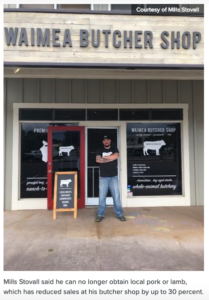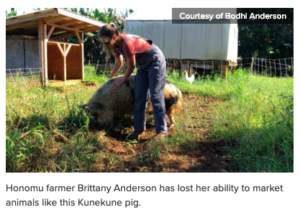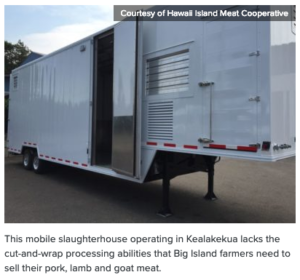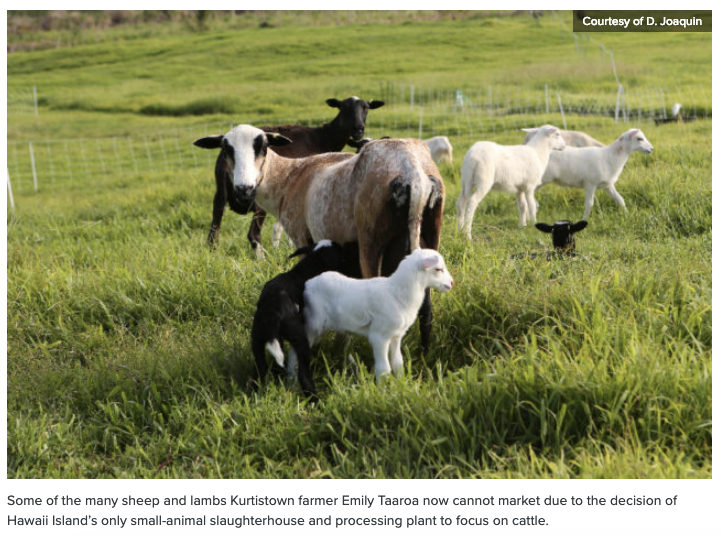Civil Eats: Big Island: Loss Of Slaughterhouse Cripples Specialty Meat Industry
by Jason Armstrong | February 11, 2019
The island’s only full-service slaughterhouse has quit taking smaller animals, leaving farmers, butchers and lovers of fresh kalua pork with no place to turn.
HILO, Hawaii Island – Local pig, sheep and goat farmers can no longer use the island’s only full-service slaughterhouse, which prevents them from selling specialty meats and has prompted some businesses to import substitute cuts from the mainland.
Those affected say the sudden inability to process smaller animals into salable food quickly created impacts statewide and negated recent growth in the Big Island’s specialty meat industry. Some are even calling the recent development a “crisis” that’s threatening the island’s food security.
“It’s going to really hurt everybody,” said Carol Fuertes, a North Kohala farmer who raises two, 10-pig litters annually.
For decades, farmers paid Kulana Foods Ltd. to slaughter their small animals at a Hilo facility that also offered USDA-certified processing, known as cut and wrap, that’s needed to produce packaged meats approved for sale to stores and restaurants.
In December, Kulana announced that it had suspended the slaughtering and processing of small animals indefinitely, choosing instead to focus on the more-profitable cattle side of its operation. Kulana President Brady Yagi did not respond to requests for comment on the decision.
The action follows the USDA having twice cited Kulana in as many months for inhumane violations. A federal regulator temporarily suspended small-animal slaughtering operations in November after a company employee failed on multiple attempts to stun a pig and again in December in response to two customers dragging a conscious pig.
The Big Island has no other full-service slaughterhouse, and farmers say they cannot overcome the government regulations and a high six-figure development cost to build their own.
 “The impacts are devastating,” said Mills Stovall, who earlier this month celebrated the second anniversary of opening Waimea Butcher Shop.
“The impacts are devastating,” said Mills Stovall, who earlier this month celebrated the second anniversary of opening Waimea Butcher Shop.
Stovall, who proudly insists on selling exclusively Big Island-sourced foods, said business has dropped 20 percent to 30 percent since he became unable to get the two to three pigs and three or four lambs needed each week to meet customer demand.
“I can tell you we’re losing thousands and thousands and thousands (of dollars),” he said.
Stovall said he plans to respond by adding fish, offering additional culinary classes and doing more restaurant-style food.
“It’s been a really big blow to the entire state,” he said. “People want the stuff raised here on the Big Island. We’ve got the best stuff in the state.”
Kurtistown farmer Emily Taaroa said she’s worked for more than three years to raise enough sheep — currently well over 60 animals — to begin local and export sales.
“Now we don’t have a market for them,” she said. “The only legal route to sell that to our customers was through Kulana.”
Taaroa and some other Big Island farmers are taking advantage of a USDA provision allowing them to do their own slaughtering and processing of animals that are pre-sold.
“We’re going to have too many animals for that particular market,” Taaroa said of the “on-the-hoof” process that prohibits the harvested meat from being re-sold.
 “It’s been really difficult on the farmers because you make your money on cuts. Selling a live animal really isn’t worth it,” said Honomu farmer Brittany Anderson, who was unable to get two of her sheep processed last month.
“It’s been really difficult on the farmers because you make your money on cuts. Selling a live animal really isn’t worth it,” said Honomu farmer Brittany Anderson, who was unable to get two of her sheep processed last month.
“We are facing a food crisis on the Big Island,” Anderson wrote in an email, adding that it’s exposing the “fragility of our food system.”
Also concerned about food security is Hilo chef Casey Halpern, who said he needs half a pig each week to supply his Café Pesto customers with kalua toppings for pizzas along with specialty dishes like pork bellies.
“It seems we love the fresh pork,” he said.
But with no local supply, chefs like Halpern have reluctantly switched to importing pork.
“Fresh pork is always better than frozen, and I was paying two to three times the price of mainland pork to buy local,” Halpern added in a text message. “That money is not going to the farmer now and that is the biggest tragedy of this situation.”
Keaau farmer Leslie Carroll said he had Kulana process 17 lambs for sale last year.
“Without the USDA inspection, we can no longer provide these businesses with our local lamb,” Carroll wrote in an email.
 Hawaii Island’s only other small animal slaughterhouse is a mobile unit that’s too limited and inconvenient to fill the gap created by Kulana’s pullback. It lacks cut-and-wrap capability, preventing farmers from receiving USDA-certified cuts approved for resale. Businesses with certified kitchens may perform their own post-slaughter processing, but are limited to what percentage of the food can be sold retail.
Hawaii Island’s only other small animal slaughterhouse is a mobile unit that’s too limited and inconvenient to fill the gap created by Kulana’s pullback. It lacks cut-and-wrap capability, preventing farmers from receiving USDA-certified cuts approved for resale. Businesses with certified kitchens may perform their own post-slaughter processing, but are limited to what percentage of the food can be sold retail.
The mobile unit actually is stationary and located in Kealakekua, which is on the opposite side of the island – a distance of up to 100 miles – from where most pigs, sheep and goats are raised. Also, it’s only open one day every two to four weeks, said Mike Amado, president of the Hawaii Island Meat Cooperative, which operates the mobile slaughterhouse.
A multiyear effort has lined up grants to cover the estimated $300,000 cost of adding a cut-and-wrap facility, but finding a suitable publicly owned site to house it has been “an extremely long, painful process” that has not been completed, Amado said.
The local specialty meat industry had benefitted from a huge push over the past two years that saw the opening of the Kealakekua mobile slaughterhouse and two Big Island butcher shops, along with numerous farmers expanding operations to fulfill customers’ demand, said Stovall, who was part of that movement.
“This has taken us back 10 years,” Stovall said of losing the Hilo slaughterhouse.
Affected people remain “in shock,” while several farmers face imminent closure, he said.
“We’ve just got to accept this horrible thing that’s happened and figure out how to move on,” he said.

They need to start a Cooperative for meat processing.